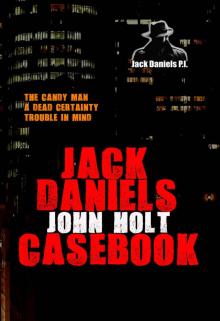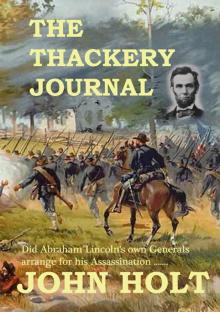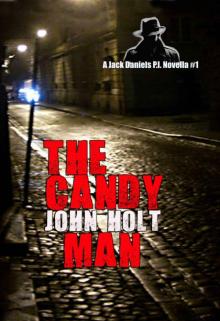Kendall - Private Detective - Box Set Read online
Page 2
Then the actual suicide note was discovered at the back of Warren’s desk. The inquiry was re-convened to consider the new evidence. It was shown that Warren had apparently accumulated huge gambling debts. He knew that he could never re-pay such sums. He was being threatened. He needed money, and he needed it fast. He had no choice. He had to falsify the accounts. The suicide note gave full details of the sums involved, together with relevant dates. Warren was frightened of being discovered, and what that would mean. He could not face the prospect of prison. There was now no doubt. Duncan had to accept it, unpalatable as it was.
“I never knew,” Duncan had said, full of remorse. “Why I never even suspected it.” His colleague and friend was dead, and he hadn’t been able to help him. “Why hadn’t he come to me for help? Why hadn’t he told me that he was in trouble?” he asked. “We could have worked something out I’m sure.”
The Coroners Court concluded that as a result of the impending scandal, Warren had taken his own life. The formal verdict of the original Inquiry remained unchanged. But Marilyn Warren, his widow, believed that she knew differently. Her husband hadn’t falsified any accounts. He hadn’t altered tax records. He hadn’t carried out illegal dealings on the stock exchange. He hadn’t manipulated the pension fund. He hadn’t done any of these things. Embezzlement, he couldn’t even spell the word. He didn’t have the brains for such a thing, she told the Coroner. “He wouldn’t know how to go about it.”
As the formal decision was read out, she stood up in the Courtroom. “He would never take his own life,” she had shouted out, with contempt. “He was too much of a weakling to do that, too much of a coward.”
The Court Usher tried to calm her, gently placing an arm around her shoulder, leading her slowly towards the door. She lashed out at the Usher, and pulled away. She looked over to where Duncan was seated. Duncan looked up, and smiled. She glared back, contemptuously. “Besides he wouldn’t do anything without Duncan’s say-so, without his permission, without his approval,” she said as she was eventually led from the room.
Her husband had not committed suicide. Of that she had no doubt, no doubt at all. She firmly believed that her husband had actually been murdered. Up until her own untimely death three years afterwards, she always suspected that Duncan knew more about the affair than he was saying, but she could never prove anything.
Duncan was mortified, but he generously made allowances for her. “I’m totally devastated that she could think such a thing of me,” he said. “We used to be so close, the three of us, especially after my wife died.” He brushed a tear from his eye. “Naturally she’s distraught. She must be dreadfully upset, and it’s no wonder. What a terrible time for her. You can understand how she feels can’t you? I mean what a dreadful shock it must have been. She doesn’t know what she is saying.” He looked up, took out a handkerchief, and wiped his eyes. “She doesn’t mean it, I know that. I forgive her.”
* * *
The Warren Center was actually part of a small development that included a number of residential apartments, and offices, together with a small shopping mall. The main section, the so-called Tower, was a modern concrete and glass structure that had been built fifteen years ago. Apart from one or two slightly curved embellishments, provided in the name of so-called style, it was nothing more than a plain box, twenty stories high. Insignificant maybe as far as normal skyscrapers were concerned. Nonetheless, it was the tallest building in the town. It was something of a local landmark, and could be seen for several miles around the town. Everyone knew the Warren Tower. You couldn’t miss it.
Apart from the height, however, it had nothing else to recommend it architecturally. Not that it was particularly ugly, because it wasn’t. But it wasn’t particularly beautiful either. In fact it had no redeeming features, none whatsoever. It was just plain, and functional. That was all that mattered according to Duncan. It had to be functional. It had also been economic, and quick and easy to construct. It was not meant to be a work of art. He did not need people admiring it for its grace, and artistic form, analyzing it in terms of its shape and space. It was a place of work that was all. It was a place in which to conduct business and make money, nothing more, and nothing less.
Chapter 2
Money, Power and Control.
Ian Charles Duncan was interested in three things and three things only, money, power and control, although not necessarily in that order. With money he obtained power. With the power came control. Control gave him even more power. More power made more money. And so the interaction was perpetuated.
Duncan had an aim, a grand plan. A vision if you will. Some might say a mission in life. He wanted more and more power. Whatever it took to get it and whatever it cost, it did not matter. But he wanted much more than just power. He wanted the ultimate in power. He wanted absolute power. He wanted the power to control others who themselves had power. In this connection he had two particular people in mind, two people that he wanted very much to control. Two people who were essential to his plan, his goal. One was the most powerful man in the State, the Governor. The other was the most powerful man in the country, indeed, the most powerful man in the world. No less than the President of the United States himself.
Duncan knew that it would be difficult, if not impossible, to get to know someone after they had become President. What with the Secret Service, advisers, Cabinet Members, White House staff, you had no chance of getting anywhere near them. Not without a good reason that is.
No, you had to make contact with them before they were elected, before they were so important. That way you had a chance to get to know them, to manipulate them, and to exert your influence over them. Then, once they had actually achieved the position of power, then you could mould them to your way of thinking.
Certainly it would be difficult, he knew that, but it was not impossible, not if you planned correctly. First, of course, you had to pick on someone who might one day become President. Then you had to ensure that they did, in fact, become President. The first part was not really that difficult, he reasoned. All you had to do was to wait for the main political Parties to nominate their Candidates. You then had long enough, before the election actually took place, to make yourself known to them, and to get to know them. And influence them. And exert your will. Shape them to your thinking, to have control over them, and their actions.
With regard to the second part of the task that was also fairly simple, in relative terms. All you had to do was support all of the front-runners. The only problem was not to let them know that you were also supporting the others. Then, at the right time, after the election was over, and the winner announced, you merely dumped the losers. One of them had to win after all. That much was certain. “Never bother with the also-rans, or the losers.” Duncan would say.
Duncan had a very simple rule in life. There were only two groups in any race – the winner, and the others. The same rule applied to life itself. There was absolutely no point in coming second. There were no prizes for effort, only for achievements. There was no advantage to be gained by losing. The only bet worth placing was the certainty, where winning was a foregone conclusion. After all, why take chances, what was the point? Gamblers never won anything.
* * *
Duncan pressed the intercom once again. Still they had not arrived. He started to clench and unclench his fingers. He looked at his watch. It was just after four forty-five. They were three quarters of an hour late. The meeting would be starting in a little over three hours time. This was to be the first in a series of fund raising meetings that Duncan had arranged. Tonight there would be a small gathering of the party faithful, the wealthy party faithful. Of course he knew that they would be preaching to the converted, to those who were already committed supporters. Nonetheless, Duncan had made certain promises, and in return certain donations would be forthcoming.
There was still so much to go over. What should be said, and the way it should be spoken. Who, of importance, and position
, was going to be in the hall later that evening? Who should he seek out? Who should he avoid? This was going to be important. It was far too important to be jeopardized by any possible slip-ups. Nothing must go wrong. It must go just like clockwork. He clicked his finger and thumb together.
Duncan reached across the desk. He picked up the handset and pressed the intercom button. Without waiting for a response he snapped, “Find them Jackson. Find them and get them here, now.”
He slammed the handset down onto the cradle. It overturned and hit the desk hard. The handset fell, and dangled over the edge of the desk. Duncan glared at the desk for a few moments. He then stood up and started to pace the floor once again.
* * *
Duncan had met Frank Reynolds just a few short months after he had been elected Governor. Prominent business people had been invited to a luncheon to discuss the future of the State, or at least listen to the Governor’s plans. Duncan had manipulated his way in, managing to get close to the Governor. Any opportunity Duncan would be there to offer advice, or make some suggestion or other. Very soon the Governor grew to trust him. He began to rely on Duncan. He would consult with him before making any major decisions.
It was soon after that certain information had come into Duncan’s possession, some information about the Governor’s recent past, some very useful information. Duncan filed it away until the right moment presented itself. A few weeks later came the opportunity Duncan was waiting for, an opportunity where he would be able to truly demonstrate his support for the Governor.
* * *
Reynolds had telephoned Duncan earlier that afternoon. He was in trouble. “I need your help, Ian. Need it badly,” he had said. “Can you come over now, today?”
“Of course I can,” Duncan had replied. It was no trouble at all. He was only too glad to be able to help. “Didn’t I say I’d be there for you? You only had to call. I said that didn’t I?” There was a slight pause. “I’ll be there later this evening, all right?”
Reynolds was bitterly disappointed. “Ian I need help now. This very moment,” he said. “Could you not get here any sooner?”
Duncan remained silent for a while. He could almost sense the anxiety building. He could hear the labored breathing. Reynolds was becoming desperate. Duncan liked that. It pleased him. “Well I don’t really think I can.”
“You must Ian,” pleaded Reynolds. “Please. You must help me. I’ve no one else to turn to.”
Reynolds was now actually begging. This was going exactly how he had planned. “Frank, Frank,” he called gently. “Leave it with me. I’ll do what I can. I won’t let you down. I’ll be there as soon as I can.” Without any further comment Duncan had hung up.
* * *
Reynolds was seated at his desk, slumped to one side. In front of him was a large glass of bourbon. There was a tap on the door, then another. The door opened and in came Jarvis, the Governor’s private secretary. “Mr. Duncan is here,” he announced.
“Show him in,” snapped Reynolds. “Quickly, then get out.”
As he approached the desk, Duncan could see that Reynolds was clearly distressed. The half empty bottle on the desk showed that he had also been drinking heavily.
“What is it Frank?” he asked concerned. He walked quickly to the desk, and sat down in front of Reynolds. “What’s the problem?” he asked. “Why hadn’t I come earlier? I never realized.”
He extended his hand, placing it on Reynolds’ arm. “You should have told me. You look terrible. Are you unwell? Should I call a doctor?”
Reynolds looked up at Duncan. “I’m not ill,” he replied angrily, pulling his arm away. “I don’t need a doctor.” His eyes were sunken and blood shot. His hands were shaking. He bent down, and unlocked the bottom drawer of his desk. He opened the drawer and took out a single sheet of paper. He glanced at the document for a few moments, hesitant, and then handed it the Duncan. “I’m being blackmailed, Ian.”
Duncan took hold of the paper, looking at Reynolds the whole time. “Blackmailed?” Duncan repeated incredulously. “What do you mean?” He then quickly glanced at the sheet of paper. He looked back at Reynolds. He then returned to the paper and read it through. He then read it once again, although much slower this time. When he had finished he laid the paper down on the desk. He then simply asked if the contents were true.
“Of course it’s not true,” Reynolds declared forcibly, glaring at Duncan. “What do you take me for?”
“Is it true?” Duncan asked once again, deliberately and slowly.
Reynolds looked down at the desktop. He closed his eyes, and took several deep breaths. “Yes,” he said almost inaudibly. “It’s true, every word of it.”
“What was that Frank?” Duncan asked. “I didn’t quite hear you. Did you say that it was true?”
Reynolds looked up. “Yes it’s true,” he replied. “Every word of it is true. But there was a good reason. I just wasn’t thinking straight, that’s all. I didn’t know what I was doing. I was just foolish. I don’t know what came over me.”
Duncan put his hand up to stop him. “No excuses Frank. I don’t want to hear. I’m really not that interested. It’s embarrassing, and it’s certainly not helpful.”
Duncan stood up, and walked over to the corner of the room, and poured himself a whiskey. He turned and looked at Reynolds. He was still slumped in the chair, with his head down. Duncan drained his glass. Then he looked away, and re-filled his glass. “Have you paid any money over so far Frank?” he asked.
“Yes,” said Reynolds, slightly above a whisper.
“I can’t hear you Frank,” Duncan called out. “Say again.”
“Yes, yes,” shouted Reynolds. “I’ve paid out a lot of money, two hundred thousand dollars altogether.”
Duncan let out a low whistle. He turned to face Reynolds once again. “That’s a lot of money, Frank, a huge amount. Where did it come from?” he asked.
“I sold a few items,” Reynolds replied. “One or two of my paintings, you know.”
“Now Frank, that’s not the truth is it?” Duncan replied. “Why are you lying to me? If you want my help you better tell me everything and I mean everything. And I want the truth. No more lying. Now, where did the money come from?”
Reynolds looked up. “All right, Ian, I’m sorry,” he said, his voice beginning to falter. “It came from Party funds.”
“I’m losing you again, Frank,” Duncan called out. “You really should speak more clearly.”
“It came from Party funds,” he shouted. “Now I have to pay it back, and quickly, before the Auditors check the accounts, and find the money missing.”
Duncan was well aware that the Auditors were due in about three weeks time. He refilled his glass once again, and walked back to where Reynolds was seated. “All right Frank, don’t let everyone know. These walls have ears. We don’t want old Jarvis knowing do we?” He picked the paper up, and read it through once more. “Have you mentioned this to anyone else?” he asked.
“No. No one else knows anything about it,” Reynolds replied. “Ian, what am I going to do? I’ll be ruined. I’ll be sent to prison. I couldn’t stand that Ian. It would kill me.”
“Now Frank, don’t you worry. It’ll be all right,” Duncan announced trying to calm him. “I’ll help you. You know that don’t you?” Duncan took out his checkbook and began to write. “You won’t go to prison. I’ll see to that.” When he had finished he tore out a check and showed it to Reynolds. It was in the sum of two hundred thousand dollars. “There. How does that look?” he asked. He started to laugh. “I imagine that you can fill in the payee details yourself.”
Reynolds did not understand what was so amusing, but he didn’t care. He was just so relieved. He started to laugh as well. It was as though a heavy load had just been lifted from his shoulders.
“I knew that I could rely on you,” he said, as he grabbed Duncan’s hand tightly, squeezing hard. “I can’t thank you enough, Ian,” he said. “You are a true fr
iend, a real friend. You said you would help, and you came through. What would I do without you?”
“No problem”, Duncan said, as he handed over the check. “Think nothing of it.”
Reynolds could not believe it. That small piece of paper had saved his career, and probably saved his life.
“Don’t worry about it,” Duncan said. “Didn’t I tell you I’d be there? If you ever needed help, you only have to call. That’s what I said, remember?” Duncan moved closer to Reynolds, and placed his arm around his shoulder. He gave a slight squeeze. “After all, what are friends for, if not to help each other?”
“I’ll pay you back as soon as I can, Ian,” Reynolds said. “You need not be concerned about that.”
“Don’t worry about it, we’re friends aren’t we? We trust each other, remember,” Duncan replied, totally unconcerned. “We’ll sort something out.” They would certainly sort something out, of that there was no doubt. He turned back to face Reynolds. “All right,” he said. “Now let’s get down to business. Let’s deal with this blackmailer, whoever he, or she, is, shall we.” He took a long drink. “What do you know about him? Or maybe it’s her?”
Reynolds had to admit that he knew nothing about the person. He suddenly felt stupid. To hand over so much money to someone you knew absolutely nothing about. “Nothing,” he said slowly. “I know nothing about them at all. It’s crazy, but it’s true.”

 Jack Daniels - Casebook
Jack Daniels - Casebook A Case Of Murder (Kendall Book 6)
A Case Of Murder (Kendall Book 6) The Thackery Journal
The Thackery Journal Kendall (Kendall Book 5)
Kendall (Kendall Book 5) Kendall - Private Detective - Box Set
Kendall - Private Detective - Box Set The Candy Man: A Jack Daniels P.I. Novella #1
The Candy Man: A Jack Daniels P.I. Novella #1 Trouble In Mind: Jack Daniels P.I. Novella #3
Trouble In Mind: Jack Daniels P.I. Novella #3 The Kammersee Affair
The Kammersee Affair